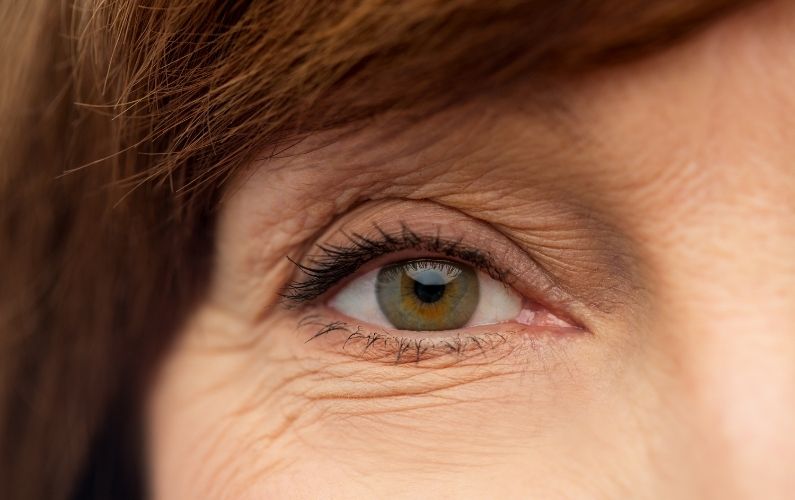How to Maintain Optimal Eye Health as You Age

Vision is an invaluable gift that allows you to see the world clearly. Learn how to maintain optimal eye health using these eye-care tips.
Maintaining clear vision and healthy eyes is not a matter of chance. Consider making these lifestyle changes to keep your eye health in check and prevent eye conditions from occurring.
Although some genetic and age-related eye conditions are unavoidable, timely eye examinations and proper eye care can help you keep your vision clear and your eyes healthy for longer.
Keep reading to learn more!
How to Maintain Optimal Eye Health as You Age
Why You Should Visit Your Optometrist Regularly
Eye conditions don’t always come with warning signs. For this reason, we recommend getting your eyes checked regularly by an optometrist.
Regular eye examinations go beyond correcting your vision. They can also help prevent various eye conditions and damage to the eyes.
Additionally, regular eye checkups can help:
- Determine if you need to wear glasses or contact lenses
- Detect common eye conditions like cataracts and glaucoma
- Treat and prevent various eye problems
- Discover age-related eye conditions like macular degeneration that can lead to poor vision and loss of sight
How Often Should You Get Your Eyes Checked?
Routine eye examinations are for everyone. Blurry vision, pain, or itchiness are not the only reasons why you should see an optometrist. Rather than waiting for eye conditions to crop up, be proactive and book regular visits.
Adults and children should schedule at least one comprehensive eye checkup every year. Those who have diabetes, are over the age of 40, or have a family history of eye conditions may require additional appointments.
If you feel any discomfort or pain in your eyes, it is always advisable to visit an optometrist without any delay. What might seem like a minor issue may indicate underlying eye health problems that require medical attention.
That said, it helps to know about some common eye conditions to understand what kind of signals indicate it’s time to seek help.

Common Eye Conditions
1. Refractive Errors
Refractive errors are common eye problems that lead to blurry or distorted vision. There are four kinds of refractive errors you should know about:
- Myopia or nearsightedness – Makes distant objects appear blurry.
- Hyperopia or farsightedness – Makes objects that are close appear blurry.
- Astigmatism – Makes both nearby and distant objects look distorted and unclear.
- Presbyopia – A gradual loss of sight that makes it difficult to focus on close objects. This problem usually affects middle-aged people.
Some common symptoms of refractive errors are hazy vision, headaches, squinting, double vision, difficulty focusing on particular objects, and tired eyes. Refractive errors can be detected through painless eye examinations by an optometrist.
2. Cataracts
A cataract is an eye condition where clouding occurs on the lens of the eyes. Cataracts are most common among older adults and typically develop gradually over time.
Common symptoms include:
- Foggy and blurry vision
- Poor night vision
- Seeing a glare around lights
- Double vision
- Sensitivity to bright light
Factors that can increase your risk of developing cataracts include diabetes, steroids, certain medications, eye injuries, and overexposure to bright sunlight.
3. Glaucoma
Glaucoma is a serious eye condition that develops due to a buildup of pressure within the eye. It causes damage to the optic nerve and typically gets worse over time.
Furthermore, glaucoma can lead to partial vision loss or complete blindness if not treated right away. People with a family history of glaucoma should be more careful as this eye condition can be hereditary.
4. Diabetic Retinopathy
People who have diabetes are at risk of developing diabetic retinopathy. This eye condition leads to a change in the retina’s blood vessels, leading to a low blood supply in the eyes. As a result, progressive damage to the light-sensitive tissue in your eyes occurs.
Timely diagnosis and managing your diabetes are essential if you want to lower your risk for vision loss.
5. Macular Degeneration
Macular degeneration causes damage to the back of the eye and results in blurring of your central vision. This condition makes it challenging to do common activities such as driving, reading, and even recognizing familiar faces.
There are over-the-counter products that can help slow down age-related macular degeneration. Speak with one of our pharmacists for more information.
Top Eye Health Tips for Maintaining Vision
Apart from visiting your optometrist regularly, there are many things that you can do to maintain optimal eye health. These eye health tips include simple lifestyle changes and preventative measures.
1. Maintain a Balanced Diet
Maintaining a healthy diet can do a lot for the eyes. Try including more green leafy vegetables, nuts and legumes, citrus fruits, carrots, eggs, and omega-3 fatty-acid-rich fish in your everyday diet.
2. Give Your Eyes a Break
Like any other part of the body, your eyes need rest too. Closing your eyes and allowing them to rest reduces excess strain on the eyes. If you work for long hours on the computer or stare at the television screen, resting your eyes is essential.

3. Stop Smoking
Most people know about the negative health consequences of smoking, but did you know that it can also affect your eye health? Smoking increases the risk of speeding up age-related eye conditions. For this reason, it is best to stop smoking if you are looking to maintain your vision as you age.
4. Use Protective Eyewear
Protect your eyes from overexposure to ultraviolet rays by using sunglasses whenever you are out in the sun. Further, if your work involves hazardous materials that can affect the eyes, make sure you wear protective eyewear.
Final Thoughts
Timely detection of eye conditions can help in correcting or delaying damage to the eyes. Don’t forget to follow these eye health tips to keep your eyes healthy as you age.
Finally, contact us here to learn more about the treatment options available for various eye conditions.
References:
- https://www.nei.nih.gov/learn-about-eye-health/healthy-vision/get-dilated-eye-exam
- https://www.lasikmd.com/blog/refractive-errors-know
- https://www.healthlinkbc.ca/health-topics/hw36825
- https://www.nei.nih.gov/learn-about-eye-health/eye-conditions-and-diseases/diabetic-retinopathy
- https://www.healthlinkbc.ca/health-topics/hw176039


